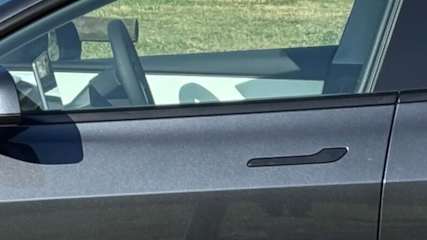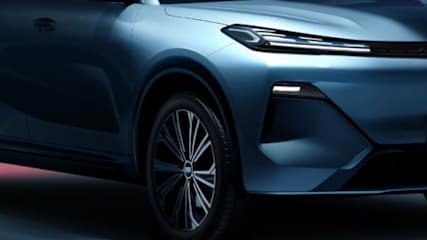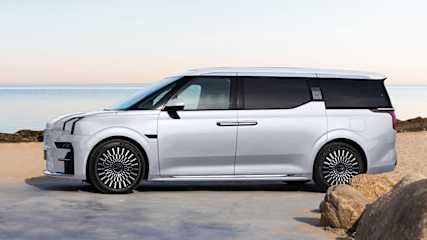Zeekr News
.jpg)
Chinese Range Rover rival detailed
Read the article
By Tom White · 09 Jan 2026
Details on Zeekr’s next model for Australia, dubbed 8X, have come to light thanks to the car’s filing with the Chinese Ministry of Industry and Information Technology.The 8X was recently teased by the brand, but the new filing reveals much deeper details.It revealed a five-or-six seater plug-in hybrid luxury car measuring more than five-meters long.The styling is more in-line with the brand’s flagship 9X and 009 people mover, featuring a slotted chrome grille rather than the more sleek grille-free styling of the 7X mid-sizer, X small SUV and 7GT wagon.It also scores impressive specifications for its plug-in hybrid (PHEV) powertrain, as the brand moves further away from its original EV-only mission.Chinese information confirms a 2.0-litre turbocharged four-cylinder engine (205kW) paired to electric motors for an as-yet-to-be-determined total power output. The larger 9X uses a similar set-up with three electric motors and has a combined power output of over 1000kW.It also features enormous battery capacities, ranging from 55.1kWh to 70kWh for pure electric driving ranges of 256km or 328km, according to the more lenient Chinese measuring protocol.Even accounting for the usual differences between this and the more widely-accepted WLTP measurements, it would still make the 8X one of the longest range PHEV on the market.The filling confirms the 8X will be more than five meters long, with a wheelbase of more than three meters, which puts it firmly in the extra large SUV category and even eclipses the Range Rover Sport in terms of footprint.The Zeekr 8X is due to hit the Chinese market in the first half of 2026, so watch this space for full details on the model.Zeekr Australia has confirmed to CarsGuide multiple new models are on its radar for 2026, including the 8X, 9X and the 7GT station wagon it recently showcased at the International EV show in Sydney.The Chinese premium marque, which serves as the premium arm of its Geely parent company and a sister brand to both Polestar and Volvo, had a slow start in Australia last year.Its X small SUV and 009 luxury people mover proved to be niche sellers, but the brand nearly doubled its volume for the year instantly with the arrival of the highly anticipated 7X fully electric mid-size SUV.As the brand builds out its line-up, it could also be bolstered further down the track by the introduction of re-badged models from its Euro-focused Lynk & Co sister brand, which has always specialised in plug-in hybrids.Stay tuned for more on Zeekr’s expansion plans later in 2026.

Ballistic new flagship SUV due in 2026
Read the article
By Jack Quick · 06 Jan 2026
China’s Zeekr has confirmed it has a new high-performance flagship SUV in the works and it’s reportedly set to launch in its domestic market during the first half of 2026.The Zeekr 8X is set to slot between the 7X electric mid-size SUV and the 9X plug-in hybrid large SUV.The Chinese carmaker has shared a few photos of the 8X with camouflage giving us an indication of what the exterior design looks like.While the 9X is clearly inspired by the Rolls-Royce Cullinan in terms of exterior design, the forthcoming 8X shrinks the form factor and brings a sportier, almost Range Rover Sport-esque look.There are C-shaped daytime running lights with a split-level headlight setup, C-shaped tail-lights with a lightbar connecting them, a roof-mounted LiDAR sensor, plus traditional pull-style door handles.As reported by Car News China, it’s expected the Zeekr 8X will be based on a version of the same SEA-S hybrid platform, which underpins the 9X. It’ll likely only offer five seats, however three-row versions might still be on the cards.Technical details haven’t been revealed yet, though the powertrains are expected to mirror what’s already offered in the 9X.This likely means there will be two or three electric motors, depending on the configuration, with a 2.0-litre turbocharged four-cylinder petrol engine acting as a range extender. Total system outputs could go all the way up to 1030kW and 1410Nm.The Zeekr 9X is already claimed to go from 0-100km/h in 3.1 seconds and it’s expected the 8X could be a little faster again given it’s a tad smaller.It’s expected the 9X’s 900V high-voltage battery packs will also carry over to the 8X. There are 55kWh and 70kWh nickel manganese cobalt (NMC) lithium-ion battery packs offered with the latter offering up to 380km of electric range in the 9X, according to the lenient CLTC cycle.If this is the case, expect a little more range for the 8X given it’s smaller than the 9X.It’s claimed you can charge the battery pack from 20 to 80 per cent in as little as nine minutes.At this stage it’s unclear whether the Zeekr 8X will be coming to Australia.Zeekr has been selling vehicles in the Australian market for over 12 months now, launching initially with the X electric small SUV and the 009 electric people mover.The Chinese carmaker recently launched the 7X electric mid-size SUV in Australia, also confirming it won’t receive any updates for the next 12-18 months.
.jpg)
Why EV haters need to back off | Opinion
Read the article
By Marcus Craft · 31 Dec 2025
The only constant is change – a smart person once said that.

China is about to ban this feature
Read the article
By Tim Gibson · 30 Dec 2025
China is about to ban a popular feature on new cars.Retractable door handles on cars will be banned in China from January 2027, according to a public notice from the Ministry of Industry and Information Technology (MIIT).Under the draft rules, cars will be required to have mechanical emergency releases for exterior and interior door handles. Exterior door handles must be positioned within accessible areas on the door or door frame. For interior side doors, they must have at least one mechanical interior handle, and a minimum of one interior handle must be visible to occupants.Many manufacturers had been adopting retractable door handles on their vehicles, with it quickly becoming the latest premium gimmick.There are also some other more practical benefits such as aiding aerodynamics by reducing drag when the car is moving. Despite the points in favour, there have been several safety concerns raised, including a fatal fire-related incident in China recently. In situations where electric vehicles become submerged or catch alight, the electrics can malfunction and halt the operation of any electric door handles, leaving occupants trapped. This latest ban will require manufacturers to rethink their approach to door handle design if they want to continue selling their cars in China.This will likely have knock-on effects for Australia given it's an important export market for many Chinese carmakers.Among the many carmakers utilising electric door handles are Tesla’s Model 3 and Model Y, as well as plenty of Chinese competitors. Similar concerns around electric door handle safety have also been raised in Australia.The Australasian New Car Assessment Program (ANCAP) has adapted its safety testing protocols from 2026, placing emphasis on electric door handles. “Increasingly popular electrically-operated door handles – which sit flush with bodywork when not in use – should remain operable after any crash,” a press release read. ANCAP’s official 2026 changes brochure expands on this. “We’re asking that cars with electric door handles – those powered by the cars’ 12 volt auxiliary battery – provide the ability for all side door handles to be in the extended/ready-to-open position immediately after a crash,” it reads. “They’ll also need to remain operable from the inside, or provide a manual override, so that occupants can exit, or first-responders can gain access inside the vehicle after a crash.”
.jpg)
Top 10 written reviews of 2025
Read the article
By James Cleary · 26 Dec 2025
New car reviews are the backbone of CarsGuide’s offering to its readers and viewers. The aim is to provide in-market buyers with the independent information they need to make an informed purchase decision and interested browsers with enough detail to satisfy their curiosity.
.jpg)
What brand does this badge belong to?
Read the article
By Laura Berry · 18 Dec 2025
Feel like there’s suddenly a whole lot of new car brands with logos you don’t even recognise.
.jpg)
Trump's huge car move announced
Read the article
By Tom White · 05 Dec 2025
America wants to see a station wagon comeback, but it won't be as easy as it sounds.

New-car carnage as China crushes siblings
Read the article
By Andrew Chesterton · 04 Dec 2025
Newcomer Chinese brands are making a real impact on Australia's new-car market, with several household name brands falling behind in November.
.jpg)
1200km+ range for Kia Sorento hybrid rival!
Read the article
By Jack Quick · 27 Nov 2025
China’s Zeekr has been spied testing a new large SUV in its domestic market ahead of an expected reveal before the end of 2025.As reported by Car News China, this new SUV will be called the Zeekr 8X, slotting between the electric 7X and plug-in hybrid 9X.It will reportedly be based on the Zeekr’s SEA-S hybrid platform, which underpins the 9X, meaning the 8X will likely be a plug-in hybrid.Power will reportedly come from a 2.0-litre turbocharged four-cylinder petrol engine with dual electric motors, producing a projected total system output of 400kW and 700Nm. This allows for a projected 0-100km/h sprint in 4.9 seconds.The electric motors will reportedly be fed by a 70kWh ternary-lithium battery pack, allowing for more than 400km of electric range, according to an undisclosed testing cycle. A smaller 55kWh will also reportedly be offered but will have less EV range.Total range in the 8X will reportedly be more than 1200km with the larger battery pack option and a full tank of petrol.The vehicle will reportedly operate on a 900V electric architecture, allowing for a 10-80 per cent battery charge in around 15 minutes.It’s understood the 8X will offer a three-row seating configuration with second-row captain’s chairs, bringing the total seating capacity to six. All the seats will reportedly be upholstered in Nappa leather.Standard equipment will reportedly include an 8.8-inch digital instrument cluster and a 14.6-inch central touchscreen multimedia system.There will also reportedly be semi-autonomous driving capabilities thanks to a LiDAR sensor, multiple cameras, as well as radar and ultrasonic sensors.This large hybrid SUV segment has been growing in China specifically and there is now plenty of competition in the domestic market. This includes the Li Auto L8 and the Aito M8.It’s unclear whether the Zeekr 8X will ever come to Australia.Zeekr has been selling vehicles in the Australian market around 12 months now, launching initially with the small X electric SUV and then the 009 electric people mover.The Chinese carmaker recently launched the mid-sized 7X electric SUV in Australia, also confirming it won’t receive any updates for the next 12-18 months.

Cheaper Chinese family EV arrives!
Read the article
By Tim Nicholson · 14 Nov 2025
Zeekr has lowered the price of entry to its 009 electric people mover range by $20,000 with the addition of a new model grade.





